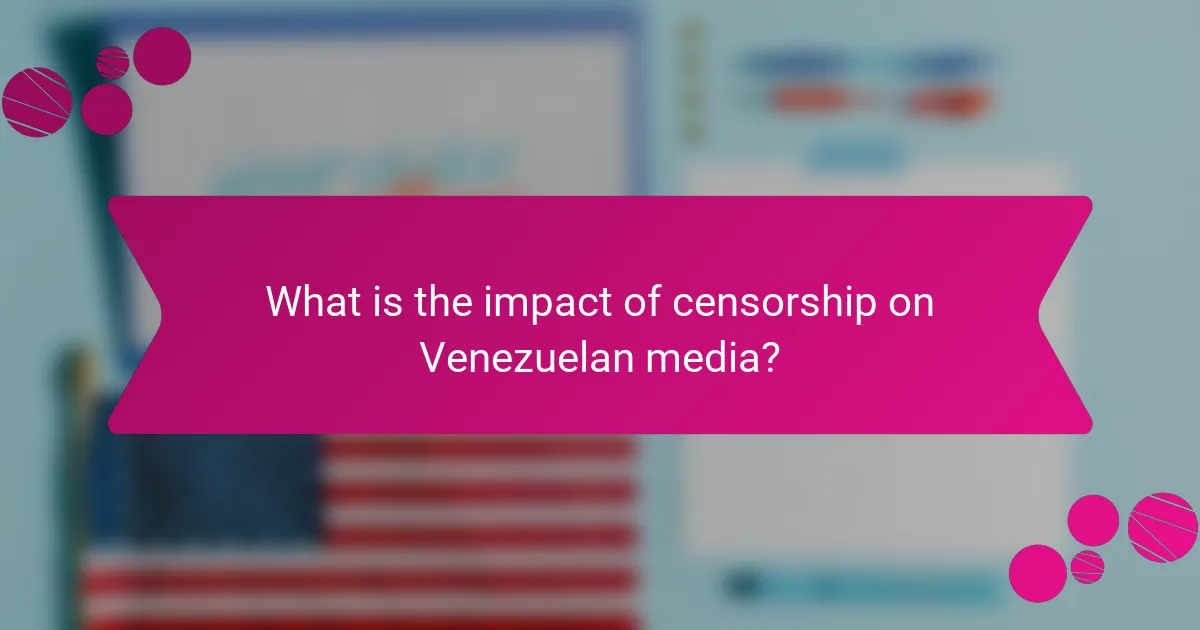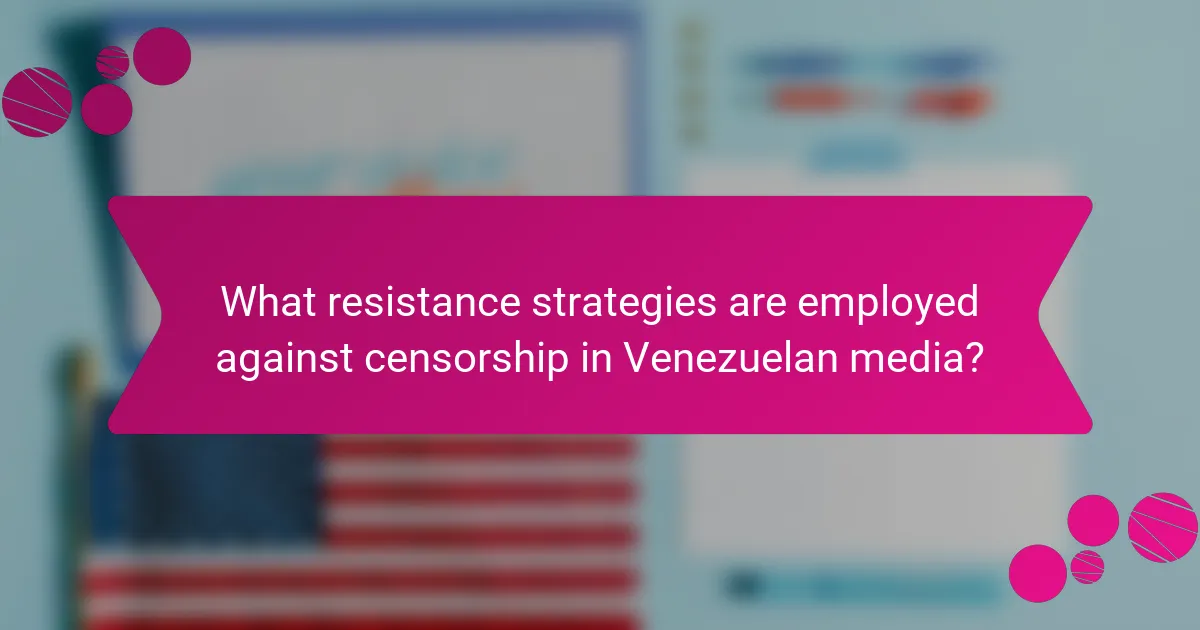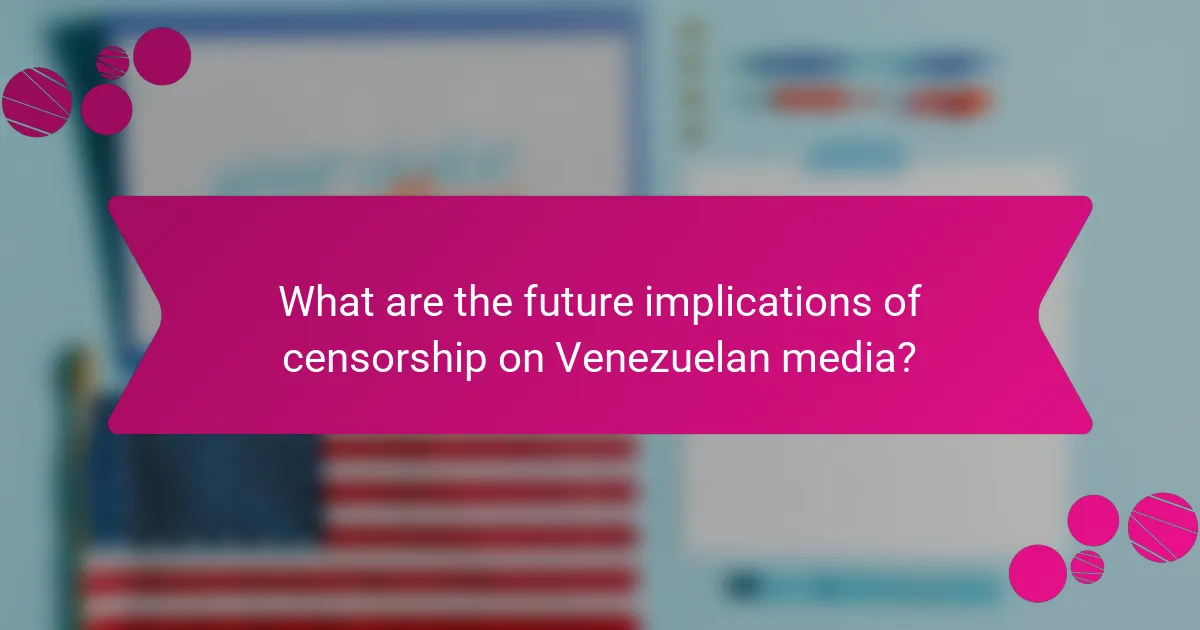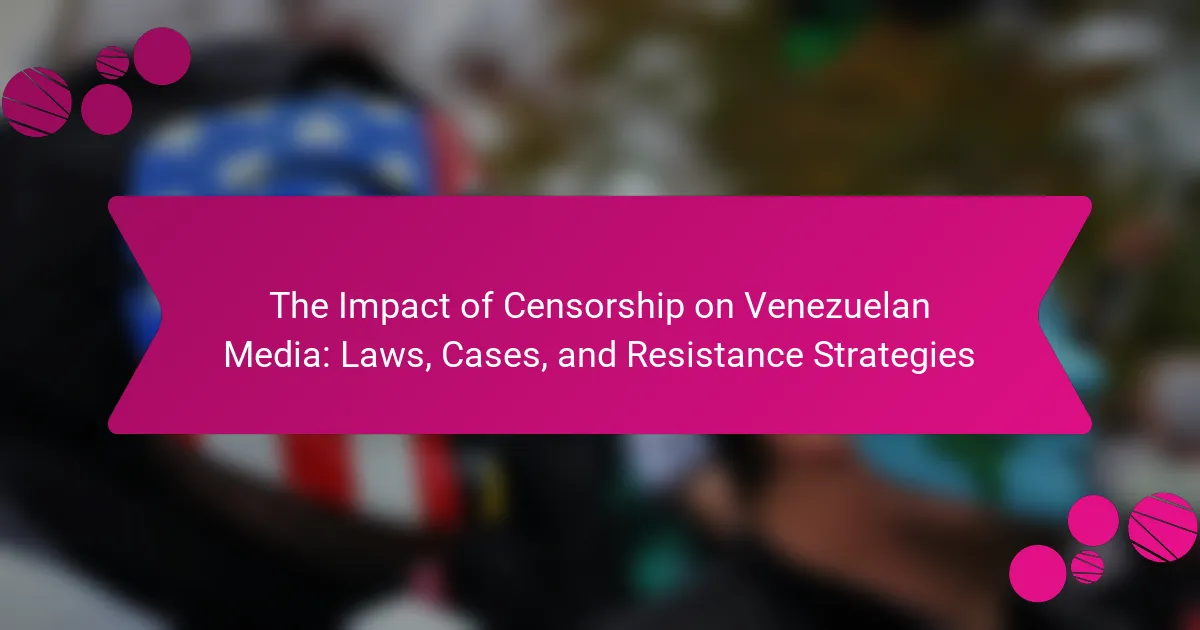
What is the impact of censorship on Venezuelan media?
Censorship significantly restricts Venezuelan media’s ability to report freely. The government imposes strict regulations that limit journalistic expression. This leads to a decline in independent reporting. Many media outlets face closure or are forced to self-censor. Journalists often experience harassment and intimidation, discouraging critical coverage. According to a report by the Committee to Protect Journalists, Venezuela ranks among the most dangerous countries for journalists. The lack of access to information undermines public discourse and accountability. Consequently, citizens receive limited perspectives on national issues. This environment fosters misinformation and propaganda.
How does censorship manifest in Venezuelan media?
Censorship in Venezuelan media manifests through government control and suppression of information. The government exerts influence over media outlets, often through intimidation and legal threats. Journalists face harassment, imprisonment, and violence for reporting dissenting views. Many media organizations have been forced to close or operate under strict limitations. The government employs tactics like blocking websites and restricting internet access to control the narrative. According to reports from organizations like Human Rights Watch, press freedom has significantly deteriorated in recent years. This environment fosters self-censorship among journalists and media professionals. Overall, censorship undermines the ability of Venezuelans to access unbiased information.
What are the primary laws governing censorship in Venezuela?
The primary laws governing censorship in Venezuela include the Law on Social Responsibility in Radio, Television, and Electronic Media and the Law Against Hate. The Law on Social Responsibility restricts content deemed inappropriate or harmful, allowing the government to impose sanctions on media outlets. This law has been used to suppress dissent and limit freedom of expression. The Law Against Hate criminalizes speech that incites violence or hatred, further enabling censorship. These laws create a framework that the Venezuelan government uses to control media narratives. They have been criticized for infringing on human rights and stifling independent journalism. Reports indicate that these laws have led to increased self-censorship among journalists and media organizations.
How do these laws affect media operations?
These laws significantly restrict media operations in Venezuela. They impose strict regulations on content, limiting freedom of expression. Media outlets face censorship, leading to self-censorship among journalists. Violating these laws can result in heavy fines or closure of media organizations. The government controls access to information, affecting news coverage and public discourse. This legal framework creates an environment of fear, discouraging investigative journalism. Consequently, the diversity of viewpoints in media is severely diminished. Overall, these laws fundamentally alter how media functions in Venezuela.
Why is censorship a significant issue in Venezuela?
Censorship is a significant issue in Venezuela due to the government’s control over media and information. The Venezuelan government restricts freedom of expression and suppresses dissenting voices. This censorship includes the closure of independent media outlets and the intimidation of journalists. Reports indicate that over 100 media outlets have been shut down since 2013. The government employs legal mechanisms to silence critics, including the Law of Social Responsibility on Radio, Television, and Electronic Media. This law imposes severe penalties for broadcasting content deemed contrary to government interests. Additionally, internet censorship is prevalent, with many websites blocked to prevent access to alternative viewpoints. These actions create an environment of fear and limit public access to information, which is crucial for democracy.
What historical context contributes to current censorship practices?
Censorship practices in Venezuela are deeply rooted in historical political repression. The country has experienced authoritarian regimes that prioritized control over information. For instance, during the 20th century, both military and civilian governments imposed strict media regulations. These regulations aimed to suppress dissent and maintain power.
The rise of Hugo Chávez in the late 1990s marked a significant shift. Chávez’s government enacted laws that restricted media freedom. The 2004 Law on Social Responsibility in Radio and Television specifically targeted opposition voices. This law imposed heavy fines and penalties for broadcasting content deemed inappropriate by the government.
Additionally, the economic crisis in recent years has exacerbated censorship practices. Limited access to resources has forced many media outlets to self-censor. Journalists face threats and violence, further stifling free expression. Historical patterns of state control have thus laid the groundwork for current censorship practices in Venezuela.
How does censorship impact freedom of expression in Venezuela?
Censorship severely restricts freedom of expression in Venezuela. The government employs various laws to control media and suppress dissent. Journalists face intimidation, harassment, and even imprisonment for reporting critical news. Access to independent media is limited, leading to a lack of diverse viewpoints. According to the Committee to Protect Journalists, Venezuela ranks among the most dangerous countries for journalists. This environment stifles public discourse and limits citizens’ ability to access information. The result is a populace that is often uninformed about political and social issues. Censorship undermines democracy and human rights in Venezuela.
What are some notable cases of censorship in Venezuelan media?
Notable cases of censorship in Venezuelan media include the closure of various television channels and radio stations. In 2007, the government refused to renew the broadcast license of RCTV, a major television network. This action sparked widespread protests and international condemnation. In recent years, the government has also targeted digital media. Websites and social media platforms have faced blocking and restrictions. Journalists have been harassed and detained for reporting on government actions. The Venezuelan National Telecommunications Commission has imposed fines and sanctions on media outlets. These actions illustrate an ongoing pattern of censorship in the country.
Which media outlets have faced censorship, and what were the outcomes?
Several media outlets in Venezuela have faced censorship. Prominent examples include Globovisión and El Nacional. Globovisión experienced government pressure leading to a shift in editorial stance. El Nacional faced restrictions on distribution and was forced to limit its print run. These actions resulted in diminished public access to independent news. The outcomes included increased reliance on digital platforms by both outlets. This shift allowed them to reach audiences despite government restrictions. However, digital platforms also faced intermittent blockages. Overall, censorship has significantly impacted the landscape of Venezuelan media.
How have journalists been affected by censorship in Venezuela?
Journalists in Venezuela have faced severe restrictions due to censorship. The government has implemented laws that limit press freedom. These laws have led to increased harassment and intimidation of journalists. Many journalists have been forced into exile to escape persecution. Others have faced arrest or violence for reporting dissenting views. According to the Committee to Protect Journalists, Venezuela is one of the most dangerous countries for reporters. The censorship has resulted in a significant decline in investigative journalism. Journalists struggle to report accurately on political and social issues due to fear of reprisals. This environment has stifled public discourse and limited access to information.

What resistance strategies are employed against censorship in Venezuelan media?
Venezuelan media employs various resistance strategies against censorship. Journalists and media outlets utilize digital platforms to bypass state control. Social media serves as a vital tool for disseminating information. Independent news websites often mirror content to evade shutdowns. Collaborations with international organizations enhance visibility and support. Exile journalists report from abroad, maintaining a flow of information. Community radio stations operate in remote areas, providing alternative narratives. These strategies reflect resilience in the face of oppressive censorship measures.
How are media organizations responding to censorship?
Media organizations in Venezuela are responding to censorship through various strategies. They are increasing the use of digital platforms to bypass traditional restrictions. Many outlets are adopting encrypted communication tools to protect their sources. Some organizations are collaborating with international media to share information. They are also engaging in advocacy campaigns to raise awareness about censorship issues. Legal challenges against government restrictions are being pursued by some media entities. In addition, journalists are forming networks for mutual support and resource sharing. These responses aim to maintain journalistic integrity despite oppressive conditions.
What innovative practices are being adopted by journalists?
Journalists are adopting innovative practices such as using encrypted messaging apps for communication. These apps enhance security and protect sensitive information from government surveillance. Crowdsourcing information through social media platforms is another practice. This allows journalists to gather real-time updates from the public. Utilizing data journalism techniques helps in analyzing large datasets for impactful storytelling. Collaborations with international media organizations provide broader reach and support. Additionally, employing multimedia storytelling techniques engages audiences more effectively. Finally, training in digital security measures equips journalists to navigate censorship challenges. These practices collectively enhance the resilience and effectiveness of journalism in restrictive environments.
How are digital platforms being utilized to circumvent censorship?
Digital platforms are utilized to circumvent censorship by enabling users to share information freely. These platforms allow for encrypted communication, making it difficult for authorities to monitor content. Social media networks facilitate the rapid dissemination of news and opinions that may be restricted. VPNs (Virtual Private Networks) help users access blocked websites and services. Additionally, decentralized platforms offer alternatives that are less susceptible to government control. For example, in Venezuela, platforms like Twitter and WhatsApp have been instrumental in organizing protests and sharing real-time updates. The use of these digital tools has been essential for activists and journalists facing censorship.
What role do international organizations play in supporting Venezuelan media?
International organizations play a crucial role in supporting Venezuelan media by providing funding, training, and advocacy. They help to counteract censorship and promote press freedom. Organizations like the Inter-American Press Association and Reporters Without Borders offer resources to journalists. They also document abuses against the media in Venezuela. This documentation raises awareness globally. Additionally, these organizations lobby for international pressure on the Venezuelan government. Their efforts aim to create a safer environment for journalists. Overall, their support is vital for sustaining independent journalism in Venezuela.
How do these organizations influence local media practices?
Organizations influence local media practices by imposing regulations and guidelines that shape content production. They often dictate the types of stories that can be reported. This is evident in Venezuela, where government entities restrict coverage of protests and dissent. Such regulations lead to self-censorship among journalists. Media outlets may avoid controversial topics to prevent repercussions. Additionally, financial pressures from these organizations can limit journalistic independence. The influence extends to the narrative framing of news stories. This creates an environment where critical voices are marginalized.
What resources do they provide to help combat censorship?
They provide various resources to help combat censorship. These resources include legal assistance for journalists facing persecution. They offer training programs on digital security and safe reporting practices. They also provide access to encrypted communication tools. Additionally, they create awareness campaigns to educate the public about censorship issues. Reports and research on censorship trends in Venezuela are also available. These resources aim to empower media professionals and protect freedom of expression.

What are the future implications of censorship on Venezuelan media?
Censorship in Venezuelan media will likely lead to decreased freedom of expression and limited access to information. As government control intensifies, independent journalism may face further restrictions. This could result in a homogenization of news content, stifling diverse viewpoints. The public may increasingly rely on unofficial channels for information. This shift can foster misinformation and distrust in media. Additionally, international organizations may respond with sanctions or support for independent media. The long-term implications may include a weakened civil society and reduced democratic engagement. A report from the Committee to Protect Journalists highlights the risks faced by journalists in Venezuela, reinforcing these concerns.
How might the landscape of Venezuelan media change in response to ongoing censorship?
The landscape of Venezuelan media may shift towards increased digital platforms and alternative news sources due to ongoing censorship. Traditional media outlets face significant restrictions, limiting their ability to report freely. As a result, journalists and citizens are likely to turn to social media and independent websites for news dissemination. This shift could foster a more decentralized media environment. Additionally, the use of VPNs and encrypted messaging apps may rise, enabling access to blocked content. These changes reflect a growing resilience among Venezuelans in seeking information despite governmental control. Recent studies indicate that independent media has gained a foothold, often relying on international collaborations for support.
What potential reforms could emerge to enhance media freedom?
Potential reforms to enhance media freedom in Venezuela could include the repeal of restrictive laws. Current laws limit journalistic independence and impose harsh penalties on dissenting voices. Strengthening legal protections for journalists can safeguard against harassment and censorship. Establishing independent regulatory bodies can ensure fair media practices and reduce government interference. Encouraging public funding for independent media outlets can diversify information sources. Promoting media literacy among citizens can empower them to seek reliable news. These reforms are essential to create a more open and democratic media environment.
How can citizens contribute to supporting free media in Venezuela?
Citizens can contribute to supporting free media in Venezuela by actively sharing independent news sources. This helps to counteract state-controlled narratives. Engaging in social media campaigns raises awareness about media censorship. Additionally, donating to independent journalism initiatives provides financial support. Participating in local and international advocacy groups amplifies their voices. Promoting digital literacy enables others to discern credible information. Lastly, attending protests for press freedom shows solidarity with journalists. These actions collectively strengthen the fight for free media in Venezuela.
What practical steps can be taken to resist censorship in Venezuelan media?
Establishing independent media outlets is essential for resisting censorship in Venezuelan media. These outlets can provide alternative news sources that are not influenced by government restrictions. Utilizing digital platforms allows for wider reach and accessibility, bypassing traditional media controls. Journalists should engage in collaborative reporting to share resources and strengthen their impact. Training in digital security is crucial to protect journalists from surveillance and harassment. Building networks with international organizations can provide support and amplify voices facing censorship. Advocating for press freedom through public campaigns raises awareness and mobilizes community support. Documenting and reporting instances of censorship helps create a record that can be used for advocacy. Engaging with audiences through social media fosters direct communication and feedback, countering state narratives.
What tools and resources are available for journalists facing censorship?
Journalists facing censorship can utilize various tools and resources to protect their work. Secure communication platforms like Signal and Telegram help maintain confidentiality. VPN services such as NordVPN or ExpressVPN allow journalists to bypass restrictions and access blocked content. Encrypted email services, like ProtonMail, ensure secure correspondence. Digital safety training programs provide education on risk management and security practices. Organizations like the Committee to Protect Journalists and Reporters Without Borders offer resources and support for journalists in distress. These tools and resources are crucial for maintaining journalistic integrity in oppressive environments.
How can the public engage with and support independent media?
The public can engage with and support independent media by actively consuming their content. This includes reading articles, watching broadcasts, and sharing their work on social media. Financial contributions are also vital. Subscribing to newsletters or donating directly helps sustain operations. Participating in community events hosted by independent media fosters connection. Advocacy for press freedom raises awareness of censorship issues. Engaging in discussions about media integrity promotes informed public discourse. Supporting independent media strengthens democracy by ensuring diverse viewpoints are represented.
The main entity of this article is censorship in Venezuelan media, which significantly impacts freedom of expression and access to information. The article explores how government-imposed laws restrict journalistic practices, leading to self-censorship and the closure of independent media outlets. It highlights notable cases of censorship, the historical context contributing to current practices, and the effects on journalists and public discourse. Additionally, it discusses resistance strategies employed by media organizations and the role of international support in combating censorship. The article concludes by examining potential reforms and practical steps citizens can take to support free media in Venezuela.
